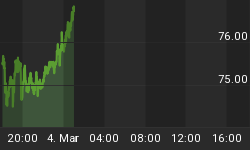There is one hell of a rant by Nouriel Roubini about who's to blame for the current mess in housing and subprime lending. Roubini's answer is "Unregulated Free Market Fundamentalism Zealotry".
While Roubini makes some points about reasonable policies that may have stopped some of the ongoing carnage, what has actually transpired was anything and everything but free market constructs.
The Unfree Markets
- We have a government sponsored "ownership society" promoting housing.
- There is government economic cheerleading.
- There is additional cheerleading by the Fed
- There was blatant promotion of ARMs and subprime lending by the Fed and Alan Greenspan.
- There are ongoing lies by the Fed and the treasury department about the state of the economy.
- The Bush administration promoted spending as a way to defeat terrorists. Typically there is (or at least there should be) sacrifices made to support a war.
- The Fed has monetary policy that excludes looking at money to make its decisions. Rampant increases in M3 were allowed to happen by the Fed. That growth fueled the houing bubble.
- We have a Fed and a government that stands ready and willing to bail out lending institutions when those institutions fail. Lending institutions know it. This encourages speculation.
- The US has an economic policy designed to kill the US dollar. Congress appropriates hundreds of billions of dollars more than it takes in. This encourages speculation in assets of all sorts, including housing.
- Japan has a ZIRP economic policy. That policy fueled a massive carry trade that contributed to speculation in all kinds of assets as well.
- There are some 300-400 government programs designed to make housing affordable that do no such thing. Yes this includes GSEs. And just because GSEs did not matter for years, that does not mean that GSEs will never matter.
- Proposition 13 laws in California and Florida benefit those who speculate in assets first. This eventually created a panic by some to "get in before it's too late".
- Our immigration policy is a mess, starting off with all kinds of free services like education and health care that illegal aliens have access to. This helped fuel the bubble as well.
- The government guarantees CDs. Many banks offered above market rates as high as 7% or more to attract capital. Much of that capital went into risky real estate projects and condos. The way to fix this problem is to stop guaranteeing CDs or at least those with rates above treasuries.
- Cities and states gave tax breaks and cheap land to developers. This encouraged overdevelopment.
None of those items has anything to do with what a reasonable person would call a "Free Market". Blaming this mess on lack of regulation on "Liar Loans" or "NINJA Loans" (No Income, No Job and no Assets) and the like misses the big picture. The big picture is we do not have remotely anything close to a free market in housing or for that matter anything else. Taken together those fifteen points all combined to encourage reckless speculation.
Is the solution then, more government regulation or less government interference in the first place? Note that in the current state of affairs there could have and should have been reasonable capital restrictions placed by the Fed on lenders. But would that have worked?
In light of the massive list of non-free market distortions noted above my answer is "perhaps or perhaps not". I suppose one could also argue that a simple rule such as "you originate a loan and you own it for 10 years" would have prevented much of this problem as well.
Then again perhaps the problem would have been solved if the Fed simply had a monetary policy that actually looked at money supply figures rather than distorted PCE deflators or the CPI.
But perhaps the real solution is to get rid of government sponsored ownership societies designed to make renters look and feel like second class citizens, and let the free markets work as they are supposed to. Blaming the free market for this mess is certainly starting in the wrong place. It was a lack of a free market that both started then escalated this mess. In that regard, the best answer is not more regulation by the Fed, the best answer is to abolish the Fed and stop doing everything else on the above 15 point list as well.
That is my answer. What is yours? Cast your vote in the who's to blame game.















